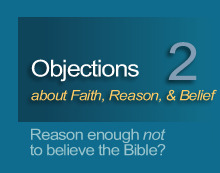"Religion has [always] been anti-human, anti-woman, anti-life, anti-peace, anti-reason, and anti-science."
- Madalyn Murray O'Hair
"We do not destroy religion by destroying superstition."
- Cicero
WHY THIS CHAPTER?
People were condemned for doubt-of-faith and other such things in the Middle Ages, but by corrupt church leaders - not by God or the Bible.
Given the implementation of similar thought-crimes and punishments throughout history (by communism, fascism, Marxism, Stalinism, etc…), it appears the problem is not linked to one's ideas about God, but instead to the all-too-human practice of oppression.
"But if you can do anything, take pity on us and help us.”
"‘If you can’?” said Jesus. “Everything is possible for him who believes.” Immediately the boy’s father exclaimed, “I do believe; help me overcome my unbelief!”
- Mark 9:22b-24 NIV
Aren't people punished for using reason or questioning the faith?
"I am pleased as punch no longer to believe in a god who declares reason a sin...."- Ruth Hermence Green
"Come now, and let us reason together," says the Lord,....
- Isaiah 1:18 NASB
In the days of the Inquisitions, the ancient Church of Rome targeted for persecution numerous groups of people, including Christian groups. The Christ-worshipping sects were included because they opposed the Roman church's claim to singular authority. One goal of this action by the Church of Rome was to claim itself as the sole interpreter of Scripture (more).
In an attempt to mandate its peculiar interpretations of Scripture, the Church of Rome defined as heresy the questioning of Roman church authority, the questioning of Rome's scriptural interpretations, and the failure to embrace its papal dogmas. At one point, it even declared possessing an English-reading Bible a heresy. These so-called heresies were defined by the institution of the medieval Roman Catholic church - these are not crimes defined in the Bible.
It is an incorrect notion that hard questions about God or faith are, or were, prohibited by the Bible, or are characteristic of Christianity as practiced outside this period. Such prohibitions and punishments were peculiar to the Catholic church of the Dark Ages. 8 By contrast, the Bible has no opposition to rational thought, honest doubts, or investigating the truthfulness of its claims. In fact, an excellent case can be made that the scriptures plainly endorse rational thought, invite the exploration of its truthfulness, and, to a point, honor sincere doubt.
One passage that might illustrate how God deals with people who have honest doubts or find him difficult to follow is the twenty-first chapter of the Gospel according to John (starting with verse 15). Peter had previously denied knowing Jesus three times at the trial before Jesus' crucifixion. But here, Jesus had risen from the dead, returned to his disciples, and now confronts Peter.
Jesus asked him, "Simon son of John, do you truly love me more than these [referring to the other disciples' love for Jesus]?" Peter responded, "Yes, Lord, you know that I love you". Three times Jesus asked, and three times Peter answered. And each time Jesus affirms Peter by exhorting him to feed Jesus' sheep; that is, to continue in his discipleship and continue growing the church.
Jesus did not condemn Peter for his failings, or for doubting him, or for not loving him enough to publicly confess his faith. Jesus accepted Peter's return to him and moreover affirmed Peter's continuance in the responsibility and privilege of looking after the church.
John the Baptist is another example. John boldly proclaimed the coming of the Christ, even recognizing and baptizing him. John was later put in prison while Jesus' ministry began and, after some time had passed, John had one of his disciples ask Jesus, "Are you the one who was to come, or should we expect someone else?" (Matthew 11:3) Clearly as sure of Jesus as John was earlier, he now poses a question that suggests a certain amount of doubt.
How does Jesus' respond? He not only provides affirming scriptural references to assuage John's doubt, he says this to the crowd before him:
As John's disciples were leaving, Jesus began to speak to the crowd about John: "What did you go out into the desert to see? ...A prophet? Yes, I tell you, and more than a prophet. This is the one about whom it is written: " 'I will send my messenger ahead of you, who will prepare your way before you.' I tell you the truth: Among those born of women there has not risen anyone greater than John the Baptist..." (Matthew 11:7-11)
From these examples, know that we can approach Jesus and the Bible, not in fear of punishment, but with expectation of favorable reception when we acknowledge, with honesty, the humble degree of faith - great or little - we know ourselves to possess. Have great faith.
See also:
The prehistory of English translations
Advice to nonbelievers



Expanded!